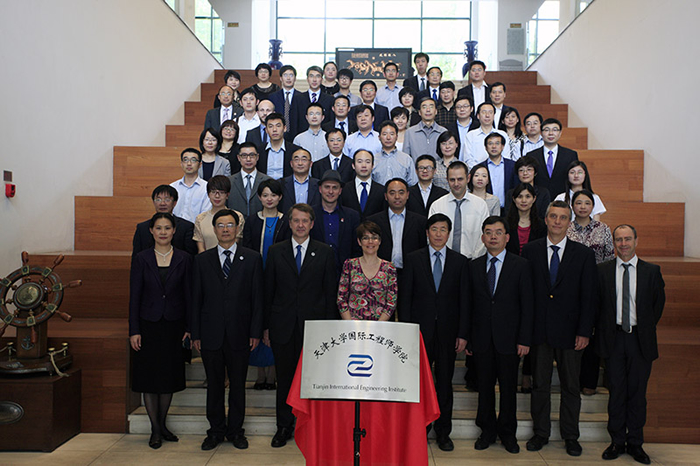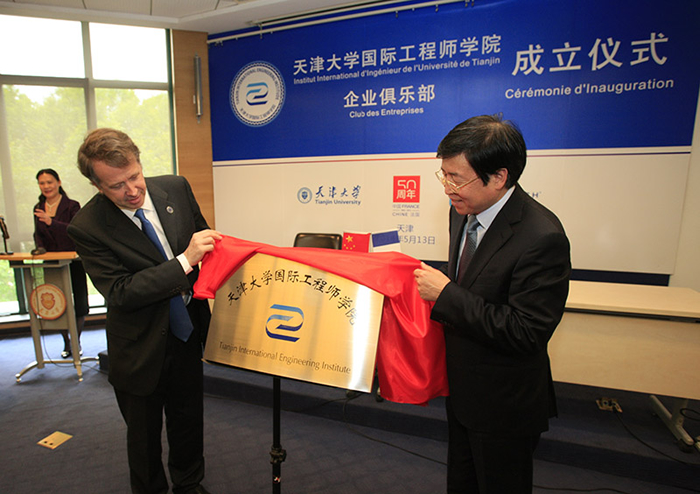Tianjin International Engineering Institute Established by TJU
2014-05-21

Tianjin University (TJU) made a great stride in the reform of higher engineering education by applying the world-famous French engineering education system and methodology. On May 13, 2014, on the occasion of the 50th anniversary of the establishment of the Sino-France diplomatic relationship, the Tianjin International Engineering Institute (TIEI) and its Business club were launched at TJU. TIEI was co-established by TJU and Polytech Nice Sophia, aiming at training top tier engineering students internationally, and making further exploration in education reform and university-enterprise cooperation.
Representatives from the French Embassy in China, Polytech Group, Polytech Nice Sophia, Alliance Francaise in Tianjin, the Tianjin High-tech Zone, and Tianjin Education Commission, as well as approximately 20 well-known enterprises at home and abroad attended the launch ceremony together with TJU President Li Jiajun, Vice President Yu Jianxing, and Assistant President Hu Wenping.

President Li announced the establishment of TIEI, and inaugurated TIEI jointly with Director Philippe Gourbesville of Polytech Nice Sophia. Vice President Yu and Qite, Manager of ZTE, signed a Memorandum of Understanding on behalf of TJU and the represented enterprises.

President Li expressed thanks during his address for the people who have made unremitting efforts towards the establishment of TIEI, and gave an overview of the establishment background of TIEI and the general framework of TJU engineering education reform.
He pointed out that TJU had educated a plethora of top engineering and technological talents for China since its establishment in 1895.The Ministry of Education initiated nation-wide engineering education reform in 2010, and Qiushi College was founded at that same time. TIEI is under the management of Qiushi College. Integrated with China’s current domestic situation, the institute will train students in accordance with international standards. The aim of TIEE is to provide graduates not only with a bachelor’s and a master’s degree from TJU, but a French engineer diploma with CTI authentication.
President Li emphasized that engineering education reform was dependent on support and cooperation from enterprise. He also hoped all attendees could work together to train talents for China and the world.
Director Gourbesville expressed congratulations on the establishment of the institute and gratitude for the efforts of all the staff who had been working for it. He indicated that the institute would not copy the French engineering education system and methodology, but take consideration of the needs of China and enterprises. According to the director, the aim of the institute is to train senior engineering and technological talents with an innovative spirit and suitability for China’s development. The training would keep the essence of the French education system: the internship. In this way, students will have a better understanding of an enterprise’s culture, management, and operations. The highlight of the institute is that faculty and students can work together in spite of different programs and across disciplines. He expressed his idea to build the institute into one of the top international engineering institutes in the world. Also, he stressed that the successful operation of the institute would require support from universities, enterprise, and government.
The University Cooperation Specialist Laure Castin from the Cultural and Education Section of the French Embassy in China expressed congratulations in her address to the launch of TIEI. She mentioned that during Chinese President Xi Jinping’s meeting with French President Francois Hollande, the two leaders agreed to consolidate the three pillars of politics, economy, trade, and cultural exchanges in bilateral cooperation. “Both countries, from leaders to ordinate people, hope for more extensive cooperation and exchange. French President Hollande especially pointed out that student exchange between the two countries should be regarded as an important task. And the French government will spare no efforts to promote this constructive protocol.” She added.
The representative of enterprises, the Asia Regional Director for R&D in Veolia Water Solutions & Technologies, Goulven Inial, referred in his address, the need of various technicians is increasing every year, while the proper, permanent and trainable talents with high quality and skill is hard to come by. The establishment of TIEI and its Business Club will provide a platform for the enterprises to participate in talent training as much as possible in order for win-win situation between institutes and enterprises.
The Deputy Director of Tianjin High-tech Zone Administrative Committee, Yin Jihui, congratulated the launch of TIEI. He said the TIEI will train international engineering talents urgently needed by market and enterprises, which is of great importance to Tianjin high-tech development. The TIEI and its Business Club will provide a platform and organizational guarantee for university-enterprise cooperation. Tianjin High-tech Zone, as a base of technology innovation and high-tech enterprises training in Tianjin, will provide strong support for TJU. Hopefully, this collaboration will make fruitful results.
XueXinnan, representing students from Qiushi College and the first group entering TIEI, made a speech, showing her expectation for training from TIEI and a confidence to succeed.
That afternoon, attendees had a further discussion on cooperation details.
The institute will open in September, 2014. The first 60 TIEI students will be selected from junior level students of TJU and first-year postgraduate students. They will enter as engineer stage students from the very beginning of their three-year studies. TIEI provides four programs: electronic information systems, civil engineering (water, environmental, and intelligent buildings), bioengineering, and computer science. A quarter of the courses will be taught by experts from enterprise, and courses will focus on training students’ practical and innovative abilities, with an emphasis on humanities and quality education. Students will have three internship opportunities with enterprises, which include a one-month cognition practice, a three-month practical internship, and a 6-month or above real engineer internship. Additionally, students will also have the opportunity for study abroad and international internships.
